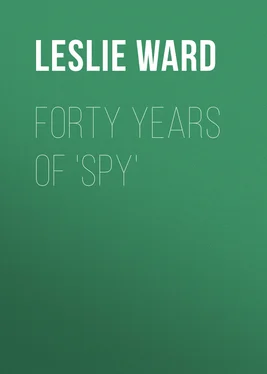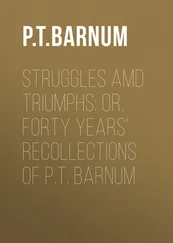Leslie Ward - Forty Years of 'Spy'
Здесь есть возможность читать онлайн «Leslie Ward - Forty Years of 'Spy'» — ознакомительный отрывок электронной книги совершенно бесплатно, а после прочтения отрывка купить полную версию. В некоторых случаях можно слушать аудио, скачать через торрент в формате fb2 и присутствует краткое содержание. Издательство: Иностранный паблик, Жанр: foreign_prose, foreign_home, visual_arts, на английском языке. Описание произведения, (предисловие) а так же отзывы посетителей доступны на портале библиотеки ЛибКат.
- Название:Forty Years of 'Spy'
- Автор:
- Издательство:Иностранный паблик
- Жанр:
- Год:неизвестен
- ISBN:нет данных
- Рейтинг книги:4 / 5. Голосов: 1
-
Избранное:Добавить в избранное
- Отзывы:
-
Ваша оценка:
- 80
- 1
- 2
- 3
- 4
- 5
Forty Years of 'Spy': краткое содержание, описание и аннотация
Предлагаем к чтению аннотацию, описание, краткое содержание или предисловие (зависит от того, что написал сам автор книги «Forty Years of 'Spy'»). Если вы не нашли необходимую информацию о книге — напишите в комментариях, мы постараемся отыскать её.
Forty Years of 'Spy' — читать онлайн ознакомительный отрывок
Ниже представлен текст книги, разбитый по страницам. Система сохранения места последней прочитанной страницы, позволяет с удобством читать онлайн бесплатно книгу «Forty Years of 'Spy'», без необходимости каждый раз заново искать на чём Вы остановились. Поставьте закладку, и сможете в любой момент перейти на страницу, на которой закончили чтение.
Интервал:
Закладка:
Mrs. Cameron was famous in those days as an amateur photographer, and she took photographs of all the leading people of the day. Watts and Tennyson were among her intimates, and most celebrities of the day knew her by sight. She was a very little old lady—I remember being in a shop (where some of her photographs were on view) with my young brother, who was a beautiful boy, when Mrs. Cameron entered. She caught sight of Russell, and could not take her eyes from his face. At last she said, "I want to know who the little boy is with you," and seemed very interested. I told her who we were, whereupon she asked if I thought my parents would allow him to sit to her. Of course they were delighted.
In 1867 Kate Terry resolved at the height of her fame to marry Mr. Arthur Lewis (of whom I have more to say later), and to retire from the stage, apparently quite content to leave her glories. Then the most famous of the Terry sisters, Kate received an ovation worthy of her. The Times , in a long article, said: "It is seldom that the theatre chronicles have to describe a scene like that at the New Adelphi on Saturday, when Miss Kate Terry took her farewell of the Stage as Juliet.... Again and again Miss Terry was recalled, and again she appeared to receive the long and continued plaudits of the crowd.... Let us close our last notice of Miss Terry with the hope that in her case the sacrifice of public triumph may be rewarded by a full measure of that private happiness which is but the just recompense of an exemplary, a laborious, conscientious and devoted life, on and off the stage, as the annals of the English theatre—not unfruitful in examples of wives—may show."
Punch was just as enthusiastic and published a long eulogy in verse, two stanzas of which I quote below:—
She has passed from us just as the goal she had sighted,
From the top of the ladder reached fairly at last;
With her laurels still springing, no leaf of them blighted,
And a fortune:—how bright!—may be gauged by her past.
May this rhyme, kindly meant as it is, not offend her,
All fragrant with flowers be the path of her life,
May the joy she has given in blessings attend her,
And her happiest part be the part of "The Wife."
Although I was not intended to enter the theatrical profession, the stage never failed to attract me; and once, when I was still at school, I was presented with a seat in exactly the centre of the dress circle at a theatre where Miss Bateman (who became Mrs. Crowe) was taking the part of Leah. I remember this fine actress made a great sensation, especially in one scene where she uttered a rousing curse with great declamatory power; the house was hushed with excitement and admiration; and you could have heard the proverbial pin drop, when I … who had been playing football that morning, was suddenly seized with the most excruciating cramp; I arose … and could not help standing up to rub away the pain in my leg, the curse then for the moment echoing throughout the audience.
Another time, somewhat later, I was again to prove a disturbing element. I was at the old Strand Theatre, in the stage box, and my host was a personal friend of Miss Florence St. John, then singing one of her most successful songs. Now I am the unfortunate possessor of a loud voice and a still louder sneeze, which latter I have never succeeded in controlling. In the middle of the song, I was overcome with an overpowering and irresistible desire to sneeze … which I suddenly did with terrific force. Miss St. John was so disconcerted, that she stopped her song, and thinking it was a deliberate attempt at annoyance from her friend—my host—called out, "You brute!" After that, I took a back seat.
Besides visiting the theatre in my holidays, I used to go sketching into the country; and one summer my parents took an old farmhouse at Arundel. This reminds me of another unfortunate propensity of mine, and that is, to tumble whenever I get an easy opportunity. When we were inspecting the house, we discovered a curious sort of uncovered coal hole under one of the front windows, and my father jokingly remarked, "What a trap for Leslie!" Three days later, when we were settled in the house, my parents were going for a drive … and as I waved them a farewell, which precipitately ended by my disappearing into this hole, my father's jest became a prophecy.
At Arundel I made friends with a brewer named Constable, who was also a clever amateur artist. Sometimes he took me fishing, but more often I watched him sketch in the open. An interesting fact about Mr. Constable was that his father had been an intimate friend of the great Constable, although, curiously enough, no relation. My friend told me that whatever he had learned had been owing to his close observation of the great artist's methods. I remember his water colours showed little of the amateur in their strength and handling, for they were masterly and forcible in touch, and perhaps more effective because they were usually painted in the late afternoon, when the sun was getting low, and the long shadows were full of strength and depth of colour.
Vicat Cole, R.A., was also a friend of his, and he used frequently to paint at Arundel.
Although I worked hard in the holidays at my drawing, I managed to enjoy myself pretty considerably, and was the fortunate possessor of many delightful acquaintances.
One of the pleasantest memories of my later school days was of a dance given by Mr. and Mrs. J. M. Levy and the Misses Levy at Lancaster Gate. The cotillion was led by Sir Howard Vincent, and many of the smart and well-known men of that day were there; among them Sir Eyre Shaw, the "Captain Shaw" of "Gilbert and Sullivan" fame. Patti, who was a very intimate friend of theirs, was present, sitting in the middle of the room looking angelic and surrounded by a host of admiring men. We were each given a miniature bugle. Patti had one also, on which she sounded a note, and whoever repeated it exactly was to gain her as a partner in the dance. The men advanced in turn, some blew too high, and others too low, until one and all gave up in disgust. At last my turn came; I was trembling with eagerness and excitement, and determined to dance with Patti or die.... I hit the note!… and gained my waltz!—and the applause was great as I carried off my prize.
In earlier days I went to a juvenile party at Lancaster Gate, and, going down to supper late, I found myself quite alone. I calmly devoted my attention to some méringues , while it seems that my people, amongst the last of the guests, were ready to go. The ladies were putting on their cloaks.... I heard the sounds of departure, but, still engrossed in the good things, I ate on. Hue and cry was raised for me; and finally I was found covered with cream and confusion amongst the méringues .
I remember, à propos of my being a "gourmand," that I was a great believer in the efficacy of prayer. My sister and I used to rise very early in the mornings after dinner-parties to rummage in and to ransack the cupboards for any dainty we fancied. After a good "tuck in," we would pray for the forgiveness of our sins, and then we would fall to breakfast with an easy conscience.
CHAPTER III
MY FATHER'S FRIENDS
My father's friends.—The pre-Raphaelites.—Plum-box painting.—The Victorians.—The post.—Impressionists.—Maclise.—Sir Edwin Landseer.—Tom Landseer.—Mulready.—Daniel Roberts.—Edward Cooke.—Burgess and Long.—Frith.—Millais.—Stephens and Holman Hunt.—Stanfield.—C. R. Leslie.—Dr. John Doran.—Mr. and Mrs. S. C. Hall.—The Virtues, James and William.—Mr. and Mrs. Tom Taylor.—A story of Tennyson.—Sam Lover.—Moscheles père et fils .—Philip Calderon.—Sir Theodore and Lady Martin.—Garibaldi.—Lord Crewe.—Fechter.—Joachim and Lord Houghton.—Charles Dickens.—Lord Stanhope.—William Hepworth Dixon.—Sir Charles Dilke.
Читать дальшеИнтервал:
Закладка:
Похожие книги на «Forty Years of 'Spy'»
Представляем Вашему вниманию похожие книги на «Forty Years of 'Spy'» списком для выбора. Мы отобрали схожую по названию и смыслу литературу в надежде предоставить читателям больше вариантов отыскать новые, интересные, ещё непрочитанные произведения.
Обсуждение, отзывы о книге «Forty Years of 'Spy'» и просто собственные мнения читателей. Оставьте ваши комментарии, напишите, что Вы думаете о произведении, его смысле или главных героях. Укажите что конкретно понравилось, а что нет, и почему Вы так считаете.












